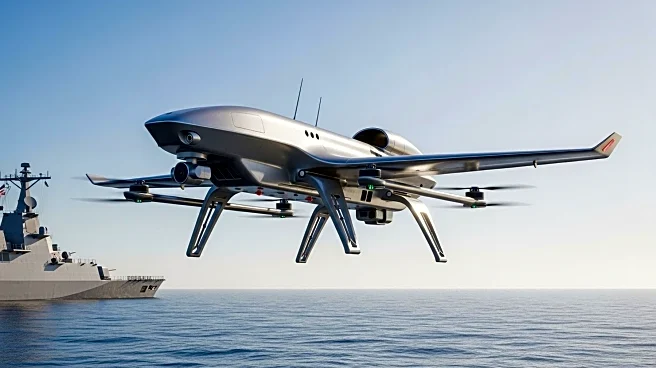What's Happening?
The UK Royal Navy has successfully conducted a trial using the Malloy Aeronautics T-150 uncrewed air system for resupplying warships. This marks a significant milestone as supplies, including spare and repair parts, were transferred from the aircraft carrier HMS Prince of Wales to the Type 45 destroyer HMS Dauntless. The drone, capable of carrying a maximum payload of 65kg, was flown autonomously over a mile before being controlled by crews on Dauntless for landing. The trials are part of the Carrier Strike Group 25 deployment to the Indo-Pacific region, with over 20 flight hours and nearly 150 deck landings logged since April. The initiative aims to reduce the logistics burden on naval helicopters, allowing them to focus on core operations.
Why It's Important?
The use of drones for logistical operations represents a significant advancement in military efficiency and capability. By integrating uncrewed air systems like the T-150, the Royal Navy can enhance rapid resupply operations, potentially reducing costs and increasing operational effectiveness. This development is crucial as it aligns with the UK Ministry of Defence's strategic vision of deploying a hybrid carrier air wing, combining piloted aircraft with drones. The successful trials demonstrate the potential for drones to play a vital role in complex military operations, offering a low-cost and easy-to-operate solution that could be adopted by other naval forces globally.
What's Next?
The Royal Navy plans to continue the trials throughout the Carrier Strike Group 25 deployment, further exploring the capabilities and benefits of the T-150 drone. As the deployment progresses, additional tests and evaluations will likely be conducted to refine the integration of drones into naval logistics. The outcomes of these trials could influence future defense strategies and procurement decisions, potentially leading to broader adoption of drone technology in military operations.
Beyond the Headlines
The integration of drones into military logistics raises important considerations regarding the future of warfare and defense strategies. Ethical and legal implications surrounding the use of autonomous systems in military operations may emerge, prompting discussions on regulations and international agreements. Additionally, the successful deployment of drones could drive innovation in civilian sectors, influencing commercial logistics and transportation industries.









